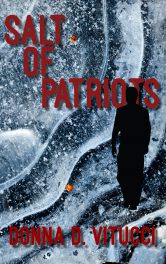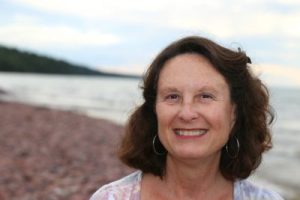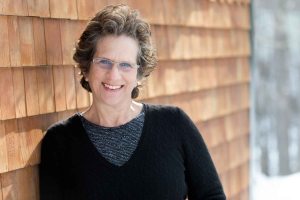Guest Post by Novelist Donna D. Vitucci

The answer to my question, How long does it take to write a book? is fifteen for the novelist Donna Vitucci, who has just published Salt of Patriots after fifteen years of research, writing and revision. In this guest post, Vitucci describes what motivated her – and kept her going.
Origin of Salt
At my mother’s wake in the summer of 1999, the reminiscences we’d heard through the years got dragged out and enlivened by re-telling. The time all Uncle Bobby’s hair fell out when he was working at Fernald. The spills and inherent danger of any other kind of factory, but Fernald was processing uranium. A different kind of plant, in the early atomic days, in the 1950s.
Fernald closed after dust collectors failed in the 1980s and leaks into the Miami Aquifer hit the press. A class action lawsuit helped shutter the plant and place it on the Superfund Cleanup List. A Public Information Center was established as an aspect of remediation activities—eureka! I’d write my family Fernald stories infused with true and accessible information.
Research
To write it, I needed to understand it, and I’m no scientist. I dashed daily to the Information Center, reading and trying to understand what Fernald workers did. What were their jobs? What might Uncle Bob have done once he clocked in for 2nd shift? What made his hair fall out?
I read The Atomizers, the Fernald company newsletter. I studied processes the Fernald scientists developed, and the chemistry and metallurgy that had men in various buildings turn out uranium ingots or rods. I sought the secrets and security, the rumors in the community, how everybody had a relative or friend who worked there, or lost their acreage, or got sick or died. Newspaper articles on microfiche announced the building of the “new plant” and how it was going to bring hundreds of jobs—which it did. The nuclear industry was in its infancy. They were playing with dice and hoping for the best in beating the Russians.
Interviews
Uncle Bobby was my eyewitness, my conduit to the past, to the plant, to the human aspect. At the time, I’d envisioned the book completed and published to celebrate Fernald’s 50th anniversary—2001. I really had no idea.
I questioned Uncle Bob: “What about losing your hair?”
“That was nothing.” Same closed-mouth attitude from interviewees and others beholden to their government, their employer, and their own promises.
“Loose lips sink ships”—caution right there in The Atomizer. I don’t believe the workers were afraid. I believe they were patriotic. I believe they believed the government wouldn’t ask them to enter a dangerous work situation. And as long as a man was working he was doing the right best thing–echoing Uncle Bob and dozens of Fernald employees in their interview transcripts.
Striving for Authenticity
What did Uncle Bob do at Fernald, what it was like, what were his buddies like, did they understand the danger, and did they care? I took notes; I had a binder of industry and government papers I’d copied. I studied these like I’d be tested. Above all, I wanted to write with authenticity, and I knew it would be so hard. Till then, I’d only written stories that emerged from inside me. This story would have to be, on many counts, outside of me. I would immerse myself in research until I was busting with the Fernaldia I ingested.
Writing, Revisitng, Revising
A year and half later, nowhere near finished mourning my mother, and now her brother, Uncle Bob, was dying. Feed Materials, as I called the book, was where I poured this loss, revisiting my loved ones, revising them, and being among them, seeing them so clearly in memory and then freshly relevant in the stories where I cast them. No wonder it took me 15 years to complete. Writing this book kept them alive, and I didn’t want to lose them twice.
 Donna D. Vitucci is a life-long writer, and was a finalist for the Bellwether Prize in 2010. Her second novel, SALT OF PATRIOTS, shines light on the nuclear industry’s early days at the Feed Materials Production Center (FMPC) by focusing on ground level workers in this rural Ohio uranium processing plant. Characters and events are inspired by her uncles, who worked at the FMPC, and imagined from hundreds of true interviews conducted as part of lawsuit remediation activities in the 1990’s. Donna lives, works, and shares the best of urban living with her partner in the Historic Licking Riverside District of Covington, Kentucky.
Donna D. Vitucci is a life-long writer, and was a finalist for the Bellwether Prize in 2010. Her second novel, SALT OF PATRIOTS, shines light on the nuclear industry’s early days at the Feed Materials Production Center (FMPC) by focusing on ground level workers in this rural Ohio uranium processing plant. Characters and events are inspired by her uncles, who worked at the FMPC, and imagined from hundreds of true interviews conducted as part of lawsuit remediation activities in the 1990’s. Donna lives, works, and shares the best of urban living with her partner in the Historic Licking Riverside District of Covington, Kentucky.

Deborah Lee Luskin has been a regular contributor to Live to Write – Write to Live since 2011. She blogs weekly about Living in Place, Lessons from the Long Trail, Middle Age, and Vermonters By Choice at www.deborahleeluskin.com. Hope to see you there!
An amazing story of research and history. My town too has a rich mining history. Gold! Nothing toxic but my research for my story Legacy of Limga had to work through some amazing documents etc. Such a big ‘cover-up’ for such a small community. The extent of the gold discovered needed to be hushed up ‘It would devalue the world price of gold’. Now 150 years later it is hard to believe what was viewed and what may be still there under the City. I have a fiction family and their journey through two world wars etc etc. has been ‘research, research, research. Wonderful but time consuming. I’m glad it has not needed to take 15 years. I hope the book after all the long research (15 years) is a success of the heart as well as appreciated for its own worth. Cheers!
Thank you for your good wishes, Faye. It’s amazing how what you discover in the research ends up dovetailing so well with what you have imagined for your fictional set of characters. Fate? Kismet? A sense of “meant to be?” That’s one of the joys in writing, I feel. And yes, these “people” live with me forever now. I hope you find it to be the same for you. All the best!
Reblogged this on Don Massenzio's Blog and commented:
Check out this guest post from author Donna D. Vitucci, from the Live to Write, Write to Live blog
Thanks, Don, for getting this farther out in the world. If readers find it useful, I’m happy!
Reblogged this on Notes from An Alien.